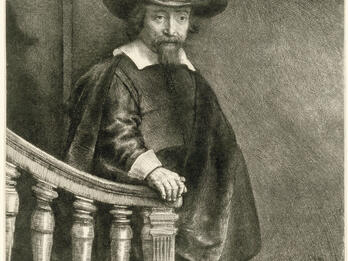Short Treatise on God, Man, and His Well-Being
Dialogue Between the Intellect, Love, Reason, and Lust
I see, Brother, that my being and perfection depend entirely on your perfection; and since the perfection of the object you have conceived is your perfection, and mine in turn proceeds from yours, tell me, I beg you, whether you have conceived a supremely perfect being, which cannot be limited by anything else, and in which I too am contained.
For my part, I consider Nature only as completely infinite and supremely perfect. If you doubt this, ask Reason. He will tell you this.
I find the truth about this indubitable: for if we want to limit Nature, we will have to limit it, absurdly, with a Nothing. We avoid this absurdity by maintaining that it—i.e., infinite Nature, in which everything is contained—is an eternal Unity, Infinite, omnipotent; the negation of these we call Nothing.
It will be marvelous, indeed, if this should turn out to be consistent: that Unity agrees with the Diversity I see everywhere in Nature: For how could this be?
I see that intellectual substance has nothing in common with extended substance and that the one limits the other and if, in addition to these two substances, you want to posit still a third, which is perfect in everything, then you will involve yourself in manifest contradictions. For if this third substance is posited, apart from the first two, it will lack all the attributes which pertain to these two. And this is impossible in a whole, outside which no thing is.
Furthermore, if this being is omnipotent and perfect, it will be such because it has produced itself, and not because something else has produced it. Nevertheless, it would be even more omnipotent if it could produce both itself and something else.
Finally, if you call it omniscient, it must know itself, and at the same time, you must understand that the knowledge of oneself alone is less than the knowledge of oneself together with the knowledge of other substances.
All these are manifest contradictions. That is why I would have advised Love to content herself with what I show her, and not to look for other things.
O dishonorable one! What have you shown me except that from which my immediate destruction would result? For if I had ever united myself with what you have shown me, straightaway I would have been pursued by two of the human race’s main enemies—Hate and Repentance—and often also by Forgetfulness. So again I turn to Reason, that he may continue, and shut the mouths of these enemies.
O lust! I tell you that what you say you see—that there are distinct substances—is false. For I see clearly that there is only one, which exists through itself, and is a support of all the other attributes.
And if you want to call the corporeal and the intellectual substances in respect to the modes which depend on them, you must equally call them modes too, in relation to the substance on which they depend. For you do not conceive them as existing through themselves. In the same way that you call willing, sensing, understanding, loving, etc., different modes of what you call a thinking substance) all of which you lead back to one, making one of them all), so I also infer, by your own proof, that infinite extension and thought, together with other infinite attributes (or as you would say, substances) are nothing but modes of that unique, eternal, infinite Being, existing through itself; and of all of these we make (as we have said) One Unique being or Unity, outside which one cannot imagine anything.
In this way of speaking that you have, I think I see a very great confusion. For you seem to want the whole to be something outside of or without its parts, which is indeed absurd. For the Philosophers all say unanimously that the whole is a second notion, which is no thing in Nature, outside human thought.
Moreover, as I gather from your example, you confuse the whole with the cause; for as I say, the whole consists of and exists through its parts; that is why you imagine the thinking power as a thing on which the intellect, love, etc., depend. And you cannot call it a whole, but a cause of the effects you have just named.
I certainly see how you call all your friends together against me. So what you have not been able to do with your false reasoning you try to do now with ambiguous words—the usual practice of those who oppose the truth. But you will not succeed in getting Love on your side in that way.
You say, then, that since the cause is a producer of its effects, it must be outside them. You say this because you know only of the transitive and not of the immanent cause, which does not in any way produce something outside itself. For example, the intellect is the cause of its concepts; that is why I call the intellect a cause (insofar as, or in the respect that its concepts depend on it); and on the other hand, I call it a whole, because it consists of its concepts. Similarly, God is, in relation to his effects or creatures, no other than an immanent cause, and also a whole, because of the second consideration.
Credits
Baruch Spinoza, “Dialogue Between the Intellect, Love, Reason, and Lust,” from The Collected Works of Spinoza, vol. 1, ed. and trans. Edwin Curley (Princeton, N.J.: Princeton University Press, 1985), pp. 73–76. Copyright © 1985 by Princeton University Press. Republished with permission of Princeton University Press, permission conveyed through Copyright Clearance Center, Inc.
Published in: The Posen Library of Jewish Culture and Civilization, vol. 5.



